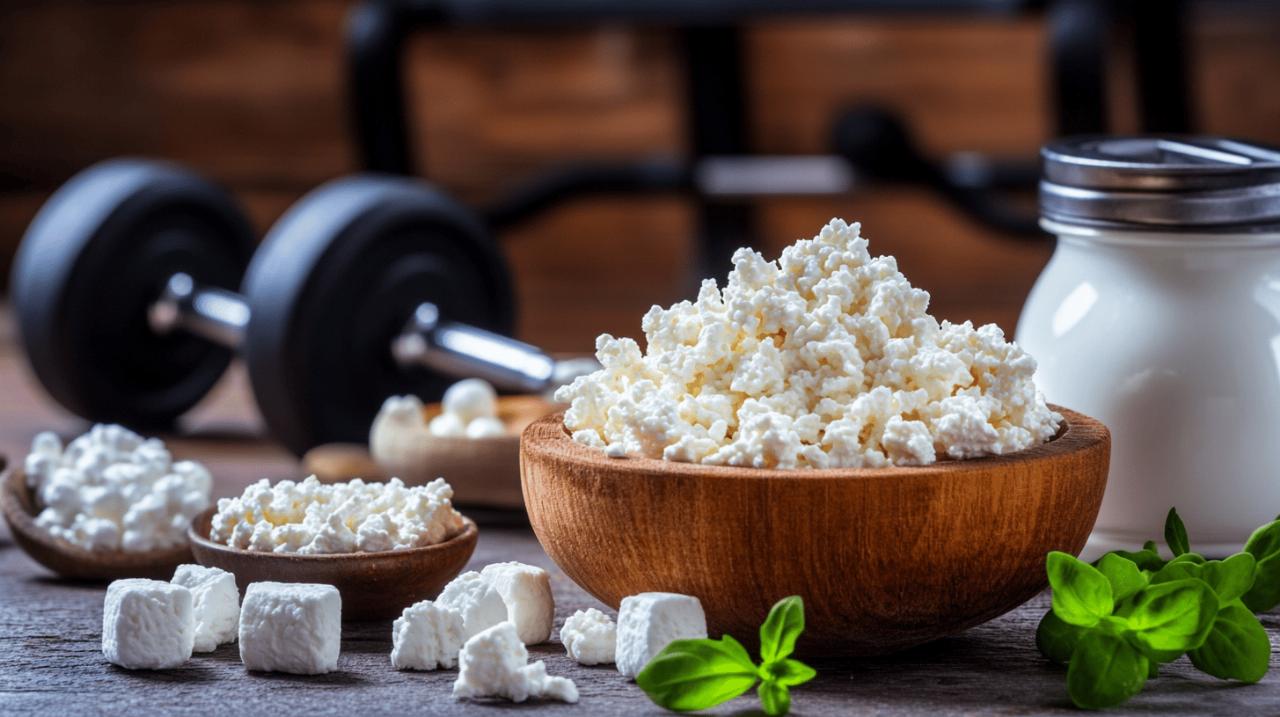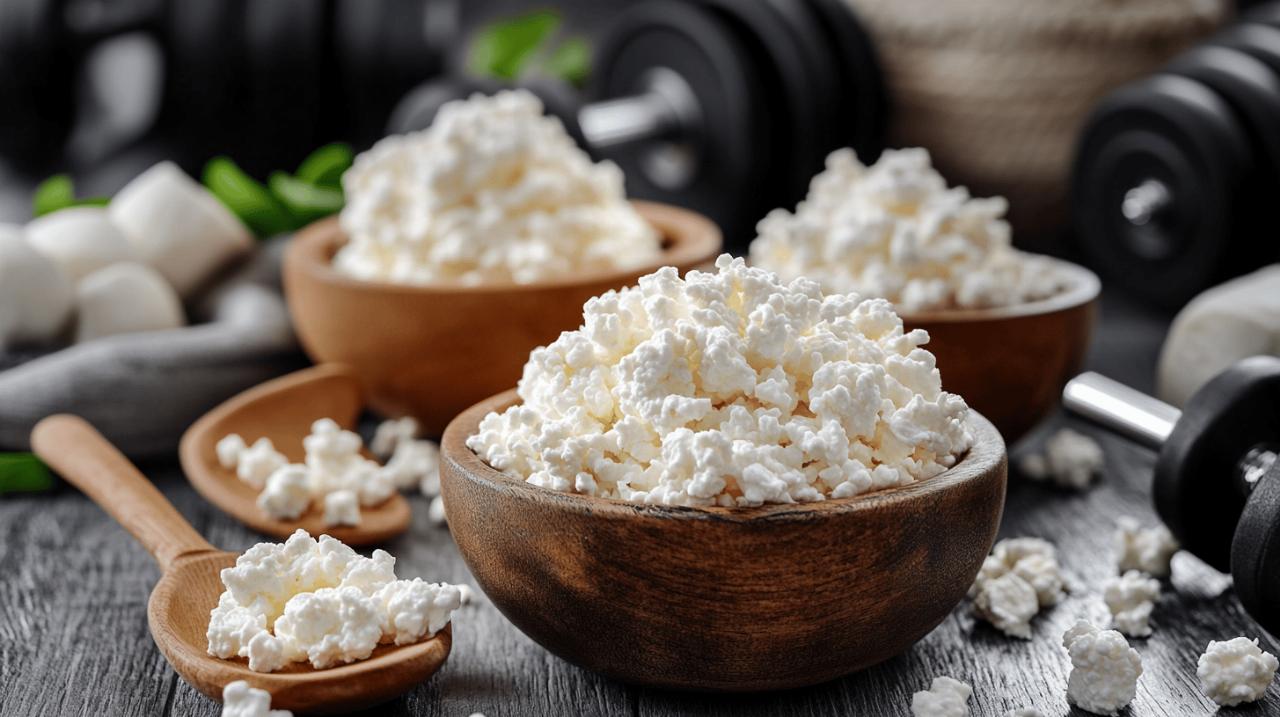Why Eat Cottage Cheese When Weight Training? Master These Simple Sweet and Savoury Recipes for Optimal Muscle Recovery
Weight training enthusiasts are constantly on the lookout for nutritional allies to support their fitness journey. While protein shakes and chicken breasts often steal the spotlight, cottage cheese quietly stands as an unsung hero in the muscle-building arsenal. This versatile dairy product delivers impressive nutritional benefits specifically suited to those engaging in resistance training, whether you're just starting your fitness journey or you're a seasoned gym-goer.
The protein powerhouse: understanding cottage cheese benefits
Cottage cheese, commonly known as fromage frais in the UK, offers a remarkable nutritional profile that makes it particularly valuable for those engaged in weight training. With approximately 28 grams of protein per 200-gram serving, it provides the essential building blocks your muscles need to repair and grow after intense workouts. Beyond just protein content, cottage cheese is considered a complete protein source, meaning it contains all nine essential amino acids that your body cannot produce on its own but requires for optimal muscle development.
Breaking Down the Nutritional Profile of Fromage Frais
The nutritional credentials of cottage cheese extend well beyond its protein content. A half-cup serving of full-fat cottage cheese contains about 110 calories, 4.5 grams of fat, and merely 3 grams of carbohydrates, making it an excellent option for those following low-carb dietary approaches. Lower-fat versions reduce the calorie count to around 80 calories with 2.5 grams of fat while maintaining the same protein punch. This dairy delight is also rich in calcium, providing approximately 20% of your daily requirement, which supports bone health during weight-bearing exercises. Additionally, cottage cheese delivers significant amounts of phosphorus, selenium, potassium, and vitamin B12, contributing to overall health and exercise performance.
How casein protein supports extended muscle recovery
What truly sets cottage cheese apart from many other protein sources is its high content of casein protein. Unlike whey protein which digests rapidly, casein forms a gel in the stomach that digests slowly, resulting in a gradual release of amino acids into the bloodstream over several hours. This slow-digestion property makes cottage cheese particularly effective at sustaining muscle protein synthesis for extended periods. Research suggests this prolonged amino acid delivery can help reduce muscle breakdown and enhance recovery, especially during overnight fasting periods when your body might otherwise tap into muscle tissue for energy. For weight trainers, this translates to more effective muscle preservation and growth, particularly when cottage cheese is consumed in the evening hours.
Incorporating cottage cheese into your training diet
Successfully integrating cottage cheese into your training regimen requires strategic timing and thoughtful combinations with other foods. The versatility of this dairy product allows it to complement various meals throughout the day, enhancing both their nutritional value and protein content. Whether you're looking to fuel up before hitting the weights or accelerate recovery afterward, cottage cheese can be adapted to serve your specific training needs.
Pre and post-workout cottage cheese strategies
Timing your cottage cheese consumption around your training sessions can significantly impact your performance and recovery. As a pre-workout option, cottage cheese provides sustained energy without causing digestive discomfort that might interfere with your training. Nutrition experts recommend consuming it approximately one hour before exercising if eaten alone, or 2-3 hours beforehand if it forms part of a larger meal. Post-workout, cottage cheese shines as a recovery aid due to its protein content supporting muscle repair processes. For optimal results after training, pair your cottage cheese with carbohydrate sources like fresh fruit or wholegrain toast, which help replenish glycogen stores while the protein tackles muscle recovery. Aiming for about 25 grams of protein per meal supports muscle building goals, making a standard serving of cottage cheese nearly perfect for post-exercise nutrition. The calcium content also supports bone health, particularly important for those engaged in regular resistance training.
Night-time nutrition: why cottage cheese makes the perfect bedtime snack
The slow-digesting nature of casein protein in cottage cheese makes it an ideal evening snack for weight trainers. During sleep, your body undergoes significant recovery and muscle-building processes, but also experiences an extended period without nutritional intake. Consuming cottage cheese before bed provides a steady stream of amino acids throughout the night, supporting continued muscle protein synthesis while you sleep. This can help minimize the muscle breakdown that naturally occurs during overnight fasting. For those concerned about disrupting sleep with a heavy meal, cottage cheese offers a light yet satisfying option that won't cause digestive discomfort. A simple serving of cottage cheese about 30 minutes before bedtime can effectively bridge the nutritional gap between dinner and breakfast, ensuring your muscles receive support during this critical recovery window.
Sweet cottage cheese recipes for muscle building
 Transforming cottage cheese into delicious sweet dishes provides an enjoyable way to incorporate this protein powerhouse into your diet while satisfying cravings for something sweet. These recipes deliver the muscle-supporting benefits of cottage cheese alongside complementary nutrients from fruits, honey, and other wholesome ingredients that enhance both flavour and nutritional value.
Transforming cottage cheese into delicious sweet dishes provides an enjoyable way to incorporate this protein powerhouse into your diet while satisfying cravings for something sweet. These recipes deliver the muscle-supporting benefits of cottage cheese alongside complementary nutrients from fruits, honey, and other wholesome ingredients that enhance both flavour and nutritional value.
Fruit and Honey Combinations to Boost Your Recovery
Fresh fruits pair wonderfully with cottage cheese, creating flavour combinations that mask the tangy dairy taste while adding natural sweetness and additional nutrients. Try topping cottage cheese with sliced strawberries, blueberries, or mango chunks, then drizzle with a small amount of honey for enhanced sweetness. This combination not only tastes delightful but also provides antioxidants and vitamin C from the fruit, which supports collagen production for tendon and ligament health during intensive training. Another delicious option is the Hot Honey Grilled Pineapple Toast, which combines cottage cheese with caramelized pineapple on wholegrain toast. The natural enzymes in pineapple may help reduce inflammation from intense workouts, while the carbohydrates from both fruit and toast help restore glycogen levels. For an autumnal twist, try cottage cheese with diced apples and a sprinkle of cinnamon, which adds warmth and potential anti-inflammatory benefits to your post-workout recovery meal.
Protein-packed cottage cheese breakfast bowls
Starting your day with a protein-rich breakfast sets the stage for muscle preservation and growth throughout the day. Cottage cheese breakfast bowls offer a customizable morning meal that can be adapted to your taste preferences and nutritional needs. The Banana Cream Pie Overnight Oats recipe combines cottage cheese with oats, mashed banana, and a touch of vanilla for a make-ahead breakfast containing an impressive 21 grams of protein per serving. The slow-digesting protein from cottage cheese complemented by complex carbohydrates from oats provides sustained energy for morning training sessions. Another option is to create cottage cheese pancakes using 100 grams of cottage cheese blended with 150 grams of porridge oats and eggs, creating a protein-enhanced version of this breakfast classic. For those preferring a more indulgent morning treat, cottage cheese brownies made with 300 grams of cottage cheese offer a protein-boosted alternative to traditional breakfast pastries, providing muscle support without sacrificing satisfaction.
Savoury cottage cheese dishes for strength training
Beyond sweet applications, cottage cheese shines in savoury dishes that deliver protein alongside herbs, spices, and vegetables. These savoury options provide welcome variety in your training diet while maintaining the muscle-supporting benefits that make cottage cheese so valuable for weight trainers.
High-protein savoury toast and cracker toppings
Transforming cottage cheese into savoury spreads and toppings creates quick, protein-rich additions to meals and snacks. Try whipping cottage cheese until smooth and blending with roasted garlic, fresh herbs, and a touch of olive oil for a protein-packed alternative to conventional spreads. This makes an excellent topping for wholegrain toast or crackers, providing sustained energy and muscle support in a convenient form. The Cottage Cheese Toast with Crispy Chilli Oil recipe elevates this concept further by adding texture and a spicy kick that awakens the palate. For something more substantial, top your cottage cheese toast with sliced avocado and roasted cherry tomatoes, creating a balanced meal with healthy fats that support hormone production during intensive training periods. Another creative application involves creating a high-protein hummus by blending cottage cheese with chickpeas and tahini, resulting in a protein-enhanced dip perfect for vegetables or wholegrain crackers that supports muscle recovery while keeping hunger at bay between meals.
Cottage Cheese Mix-ins for Omelettes and Savoury Bakes
Incorporating cottage cheese into cooked dishes significantly boosts their protein content while adding moisture and creaminess. Stirring cottage cheese into beaten eggs before making an omelette creates a fluffier texture while substantially increasing the protein content of this already nutritious dish. The additional protein supports muscle recovery after morning training sessions without requiring additional meal preparation time. For a more substantial meal option, cottage cheese can transform pasta dishes into protein powerhouses. The Creamy Kale Pasta recipe uses cottage cheese to create a rich sauce that delivers muscle-supporting nutrition alongside complex carbohydrates for glycogen replenishment. Cottage cheese also shines in baked dishes like the Winter Squash and Spinach Lasagne, where it replaces traditional ricotta while boosting the protein content. With 300 grams of cottage cheese in the recipe, each serving delivers substantial protein alongside vegetables and complex carbohydrates, creating a balanced meal that supports training recovery. These savoury applications make cottage cheese an incredibly versatile addition to a strength training nutritional plan.
